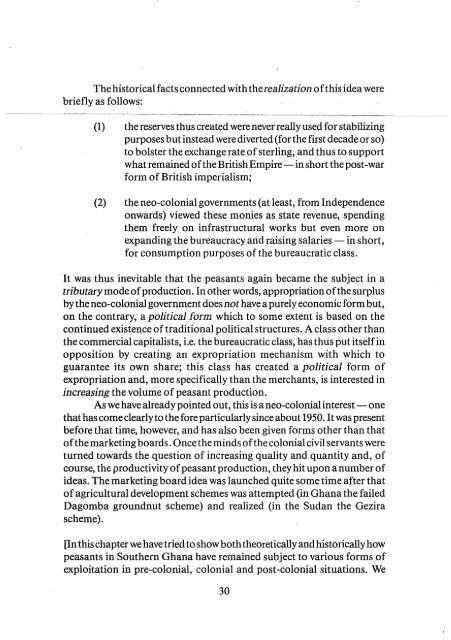Create successful ePaper yourself
Turn your PDF publications into a flip-book with our unique Google optimized e-Paper software.
The historical facts connected with the realization of this idea were<br />
briefly as follows:<br />
(1) the reserves thus created were never really used for stabilizing<br />
purposes but instead were diverted (for the first decade or so)<br />
to bolster the exchange rate of sterling, and thus to support<br />
what remained of the British Empire - in short the post-war<br />
form of British imperialism;<br />
(2) the neo-colonial governments (at least, from Independence<br />
onwards) viewed these monies as state revenue, spending<br />
them freely on infrastructural works but even more on<br />
expanding the bureaucracy and raising salaries in short,<br />
for consumption purposes of the bureaucratic class.<br />
It was thus inevitable that the peasants again became the subject in a<br />
tributary mode of production. In other words, appropriation of the surplus<br />
by the neo-colonial government does not have a purely economic form but,<br />
on the contrary, a political form which to some extent is based on the<br />
continued existence of traditional political structures. A class other than<br />
the commercial capitalists, i.e. the bureaucratic class, has thus put itself in<br />
opposition by creating an expropriation mechanism with which to<br />
guarantee its own share; this class has created a political form of<br />
expropriation and, more specifically than the merchants, is interested in<br />
increasing the volume of peasant production.<br />
As we have already pointed out, this is a neo-colonial interest - one<br />
that has come clearly to the fore particularly since about 1950. It was present<br />
before that time, however, and has also been given forms other than that<br />
of the marketing boards. Once the minds of the colonial civil servants were<br />
turned towards the question of increasing quality and quantity and, of<br />
course, the productivity of peasant production, they hit upon a number of<br />
ideas. The marketing board idea was launched quite some time after that<br />
of agricultural development schemes was attempted (in Ghana the failed<br />
Oagomba groundnut scheme) and realized (in the Sudan the Gezira<br />
scheme).<br />
[In this chapter we have tried to show both theoretically and historically how<br />
peasants in Southern Ghana have remained subject to various forms of<br />
exploitation in pre-colonial, colonial and post-colonial situations. We<br />
30
















